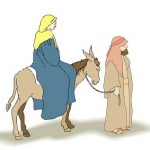Habakkuk 2:1 NIV
I will stand at my watch and station myself on the ramparts; I will look to see what he will say to me, and what answer I am to give to this complaint.

Photo by Maria Camila Castaño from Pexels
Waiting an answer
In the last session, I referred to the phone calls we often make. When we are waiting for an answer to our call only to be told, “Be patient your call will be answered” is frustrating. When your call has been placed in an automatic answering system there is very little you can do to get a speedy answer. You have a choice to make. Impatiently put down the phone and try again later – or patiently await your turn in the queue.
- When God appears to place you ‘on hold’ what is your usual reaction? Do you hang up on Him? Or do you, like Habakkuk, spend time waiting for Him and watching? Perhaps you phone a Christian friend. What do you do?
- Habakkuk placed himself in a position where God could answer his call. How about you? Do you have a special place where you can listen for God? If not, can you think of one? Preferably a place you can be quiet, perhaps read Scripture, and pray. Try to develop such a place so that when you go there, your mind automatically begins to seek God.
We all need to discover that quiet place, a place where, if possible, we will not be disturbed. Where God has an opportunity to speak into our hearts. Somewhere we can deliberately switch off our own rational thoughts and invite God to speak to us.
Those special waiting-upon God places
Although we ideally want to be open to God at all times, I know have a variety of places where I am more likely to hear from Him.
A fellow Bible College student used to take a long run each morning. He communicated with God while running.
One of Shirley’s author friends has a hammock in her garden. As she enjoys nature, she is more open to the voice of God.
I can identify with her sentiments. My elder son has a lovely home with a large beautiful garden. When we visit them for a few days I often go and sit at some spot in their garden each morning for my quiet time. With the sound of the birds in the trees and soft running water from a small fountain, it is a great place to meet with God, waiting for a message from Him.
- Can you identify a spot where you can go to, possibly not every day, that will supplement that time we spoke of earlier—the regular daily location.?
Awaiting God’s answer
The second part of Habakkuk 2 verse 1 is very interesting.
Most translations have ‘wait to see’, ‘wait and see’ or ‘watch to see’. The NIV and a couple of others have – “I will look to see what He will say to me.” I like that.
Notice Habakkuk didn’t say, “I will listen for His voice.” The clear picture here is of Habakkuk taking up a position where he could actually see how God would respond to his question. Perhaps through a vision, angelic visitation, dream, supernatural event, a change in circumstances, whatever . . . He is looking for a very definite sign of God’s response.
Jesus’ communication with God.
I am sure you know how some of the great Christian leaders of the past spent time with God. Their example is certainly an inspiration to us. But surely our greatest example is our Lord Himself? Scripture does not record all the times that Jesus communicated with His Father in Heaven, but a number of significant occasions are recorded for us.
Jesus prayed:
- at His baptism by John the Baptist—Luke 3:21
- before choosing the twelve apostles—Luke 6:12-15
- at the raising of Lazarus from the dead—John11:41
- at the Last Supper—John 17:1
- in the Garden of Gethsemane—Matthew 26;39ff; Mark 14:35ff; Luke 22:41ff
In addition, during His three-year ministry, Jesus often withdrew from the crowds and even the twelve, in order to meet with God. Scripture records that He often went up a mountainside to pray. Could that have been a daily event? Definitely not. It was His special place to commune with His Father.
Awaiting signs of God’s answer
Just as the watchmen on the city walls or in the vineyard placed themselves in a position where they could see clear signs of approaching danger, so too the prophet was taking up a position where he could see signs of an answer to his complaint.
- When you are praying for a specific situation, what signs do you expect to see of God’s answer?
- How do you ‘look to see’ how He will answer?
God may delay His answer to your prayers but be assured of this one thing, God does want to answer your prayers. He will answer your prayer in due course.
Our responsibility lies in waiting for that answer. That doesn’t mean that we stop praying for the answer, but our prayer can take on a note of assurance because we know He will answer. So we watch in anticipation for the answer. And of course, we acknowledge it when it does come. We continue to pray, regardless of any negative vibes, until we receive a clear answer.
It's amazing what you don't get when you don't ask - attributed to Berney Neufield Share on X
Phillips Brooks has this to say about prayer.
Rather than praying for an easier lfe, pray for a stronger person. Rather than praying for challenges equal to your abilities, pray for abilities equal to your challenges. Then the miracle will not be what you have done, your work—but you shall be the miracle. Then every day you will wonder at yourself and the richness of life that God in His grace has given you. (Phillips Brooks)
What have you learned today? What action are you going to take? How about finding that special place? Or identifying a spot for your daily quiet time.
“Never give up praying. And when you pray, keep alert and be thankful.” (Colossians 4:2 CEV)
P.S. If you haven’t yet read the background to the prophecy, please do. It will benefit you throughout this series of studies.















